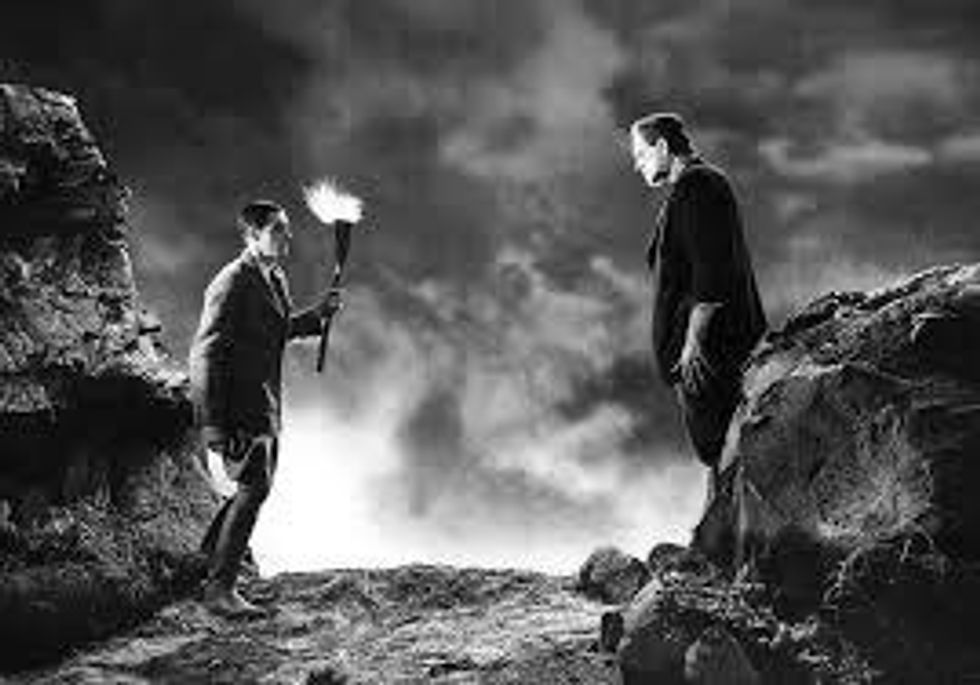Genetic engineering, stem cells, space exploration, communication/informational omnipotence, and cold fusion are all very real scientific projects that are being worked on today, and rightfully so. When people debate against humanity’s ever expanding control over nature they often will bring up classical tales of failed science, the most famous example being "Frankenstein". "Frankenstein", written by Mary Shelly in 1818, tells a dramatic and poetic story of a man being haunted by one of his scientific creations. Most people read the story and come to the conclusion that the moral of the book is that science is evil, but it is not that straightforward. In the end of "Frankenstein", Mary Shelly leaves it up to society to discuss man’s ambitions, and the answer is that progress is necessary, but requires some level of thoughtful examination.
It is pretty safe to say that "Frankenstein" is a warning to be careful with science, but to say that it is completely anti-science isn’t true. While Victor Frankenstein, a scientist who ruined his life by making a creature that sought revenge for being wronged by his creator, is on his deathbed--he talks to newly acquainted friend Walton (who he found in the middle of the arctic while chasing down the creature). Frankenstein reflects on his own life and tries to give Walton advice, “Seek happiness in tranquility and avoid ambition, even if it be only the apparently innocent one of distinguishing yourself in science and discoveries. Yet why do I say this? I have myself been blasted in these hopes, yet another may succeed.” (Frankenstein, 182). These are his last words (at least mentioned in the book) before he dies. It is apparent that there is a moral to the story revolving around “distinguishing yourself in science and discoveries,” but to say that it is distinctly against being ambitious clearly contrasts with his last sentence. "Frankenstein", or Mary Shelly through "Frankenstein", is warning society that we have to be careful with our rampant aspiration, or else there may be disastrous consequences, such as a large monster seeking revenge on you by murdering all your friends and family. However, she is not against society moving on in the world.
There is no logical defense against progress, only against reckless progress. Through discovery and ambition society has improved in ways unimaginable to humans centuries ago, never mind the dawn of man. Of course there are negatives with the modern world, but that is because of negligence, not science. Some may say that humans have no right to manipulate nature and that we do not have the right to play God. First, if one is using the God argument then it is important to understand God’s expectation of human dealing with nature, for Genesis says “And God blessed them, and God said unto them, be fruitful, and multiply, and replenish the earth, and subdue it: and have dominion over the fish of the sea, and the over the fowl of the air, and over every living thing that moveth upon earth,” (Bible, King James Version, Line 28). This explains that God ,very clearly, has no problem with man controlling, or having “dominion” over, nature. Secondly what they may not appreciate is that humans have to manipulate nature. It is how we have survived so far; without tools humanity would be extinct. Technology and progress is what makes humans what they are, and ambition is built into our genetic make up. Recently science has reached a new level in medical improvement: sensory prosthetic limbs. The "Washington Post" published an article describing the experiment, “[the results of the experiment] offer a breakthrough in the restoration of a critical function in people with paralyzed limbs: the ability not just to move those limbs, but to feel them.” (Amy Nutt). We can replace a dead limb with an equally good, possibly better, robotic one, therefore undoing the process of killing the limb in the first place. This is incredible and a perfect example of the greatness of modern day science, as well as progress.
The important thing, and what Mary Shelly wants us to consider, is that we need to make sure that the perfect modern day science/progress is truly perfect, and not overly dangerous. For example, we have to make sure that the robotic arm doesn’t have a high rate of sudden combustion or uses it's obviously superior sock puppet skills to amass a fortune which it then uses to take over the world. These are important things to consider. When Frankenstein created a life, he made incredible strides in the field of science, but he didn’t nurture and consider the implications of this new creature. In the end he paid for it with his (and all his loved ones’) life. It is important that a species check their ambitions, and consider every aspect of the major tasks they undertake. In a sense our power of progress and ambition is a double edged sword: we need to achieve great things to move up as a society, but we have an obligation to make sure that they are truly great things, not our downfall.



























